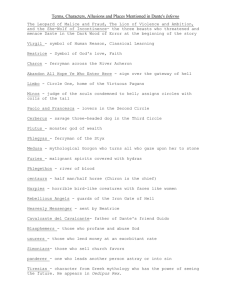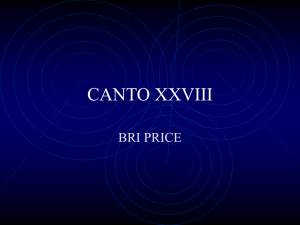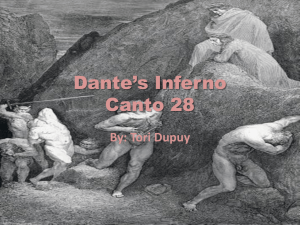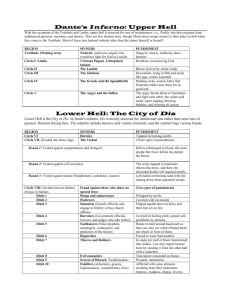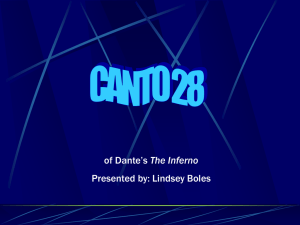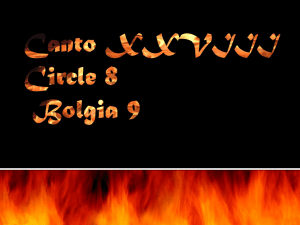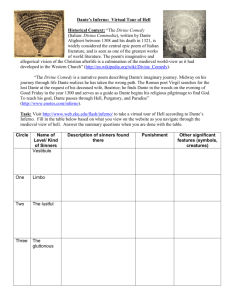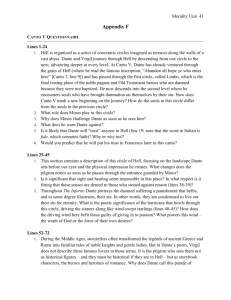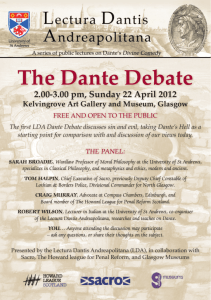muhammad in hell - Campbell M Gold
advertisement
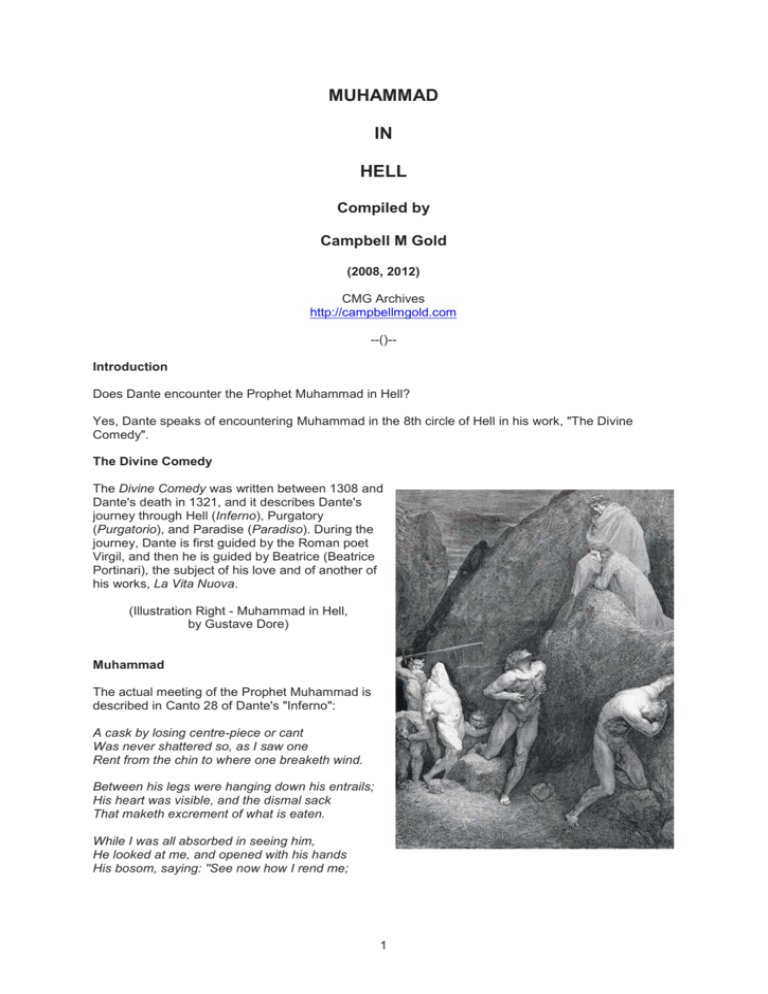
MUHAMMAD IN HELL Compiled by Campbell M Gold (2008, 2012) CMG Archives http://campbellmgold.com --()-Introduction Does Dante encounter the Prophet Muhammad in Hell? Yes, Dante speaks of encountering Muhammad in the 8th circle of Hell in his work, "The Divine Comedy". The Divine Comedy The Divine Comedy was written between 1308 and Dante's death in 1321, and it describes Dante's journey through Hell (Inferno), Purgatory (Purgatorio), and Paradise (Paradiso). During the journey, Dante is first guided by the Roman poet Virgil, and then he is guided by Beatrice (Beatrice Portinari), the subject of his love and of another of his works, La Vita Nuova. (Illustration Right - Muhammad in Hell, by Gustave Dore) Muhammad The actual meeting of the Prophet Muhammad is described in Canto 28 of Dante's "Inferno": A cask by losing centre-piece or cant Was never shattered so, as I saw one Rent from the chin to where one breaketh wind. Between his legs were hanging down his entrails; His heart was visible, and the dismal sack That maketh excrement of what is eaten. While I was all absorbed in seeing him, He looked at me, and opened with his hands His bosom, saying: "See now how I rend me; 1 How mutilated, see, is Mahomet; In front of me doth Ali weeping go, Cleft in the face from forelock unto chin; --()-Dante (c.1265-1321) Durante degli Alighieri (c.1265 - 14 Sep 1321) is commonly known as Dante Alighieri, and was a Florentine poet of the Middle-Ages. His most widely known work is the Divina Commedia (originally called "Commedia" and later called "Divina" (divine) by Boccaccio hence "Divina Commedia") This work is often considered the greatest literary work composed in the Italian language and a veritable masterpiece of world literature. (Picture Right - Dante Alighieri, painted by Giotto in the chapel of the Bargello palace in Florence. This oldest portrait of Dante was painted during his lifetime before his exile from his native city) Giovanni Da Modena's c.1415 Fresco The ideology that Muhammad was "hell-bound" is further explored in the c.1415 fresco, "Last Judgement", by Giovanni Da Modena Bologna’s 14th century Basilica of San Petronio houses the c.1415 fresco of "The Last Judgement", by Giovanni da Modena, and visualizes the final fate for the Prophet Mohammed: bound to a rock in Hell, and being clawed by demons. (See Pictures Below) --()-- 2 --()-The 8th circle of Hell Dante encounters Mohammed in the 9th ditch, of the 8th circle of Hell. (Picture Right - An illustration of Hell, which appeared in one of the 16th century publications of Dante's "Divine Comedy") The 8th "Circle of Hell" was subdivided into ten rocky clefts, or ditches, which were called "bolgias", and were populated as follows: 1st ditch - Panderers and Seducers Here, two lines of naked souls (seducers on the inside, and panderers on the outside) move jog in opposite directions. Horned demons chase after them with whips and lash them, causing "immense and eternal pain". 2nd ditch - Flatterers There is a "stench most foul" here - the flatterers are drowning in excrement. They are forced to smell the "disgusting odour", and are to wallow around in the "grotesque filth" for the rest of eternity. 3rd ditch - Fraudulent Ecclesiastics, Sinners and Mockers of God This ditch is comprised of tube-like holes distributed in the ground, which house upside down sinners and mockers of God. The sinners' legs are exposed to the calf and their "feet are ablaze" (heated according to the amount of their guilt). Here, the sinner remains until another person, who has sinned as they have, arrives to take their place and crush them deeper into the hole for all eternity. 3 The "Simonists" are specifically mentioned, who were "fraudulent ecclesiastics" who profited from the Church or from its offices. (Picture Right - Lucifer, King of Hell by Dore) 4th ditch - Fortune-tellers The Fortune-tellers are a group of weeping shadows who find themselves in the 4th ditch. Here we find fortune tellers, diviners, and sorcerers - those who, in life, sought to see the future. Now, they are doomed to walk forwards with their heads twisted behind so that they are unable to see what is coming. This punishment is reflective of the words of the prophet Isaiah: "Who makes the signs of those who give word of the future come to nothing, so that those who have knowledge of secret arts go off their heads; turning the wise men back, and making their knowledge foolish...(Isa, 44:25)". Having claimed to be able to see the future in life, these sinners' heads are now twisted around, so completely, that "their tears fall on their buttocks". 5th ditch - Grafters The fifth ditch is full of sticky pitch and contains the Grafters, who sinned against the State and are now tormented by a company of pitchfork-wielding devils. Grafters are those who were placed in public offices and betrayed the civic trust; namely, they stole things by using their power and influence. Once again, the punishment fits the crime as the sticky pitch mirrors the sticky fingers of the grafters. 6th ditch - Hypocrites Here, we find the Hypocrites, wearing gilded but heavy, lead-lined cloaks. And it is here that we find Caiaphas, Pontius Pilate's evil counsellor, who has been crucified and impaled by three stakes. The hypocrites have been sentenced to walk endlessly in a circle, while weighted down by their robes of lead. "The outside is all dazzle, golden and fair"; however, the robes are lined with lead, to represent the weight of the "sinner's deceit". Dante purposely describes the robes as being similar to those worn by monks to further condemn the hypocrisy of false worship. 7th ditch - Thieves Thieves are attacked by serpents in the seventh ditch. The thieves spend eternity being burned into ashes, before being returned to human form. Here is the eternal resting place for the souls of the thieves. The ditch is full of snakes and reptiles that eternally torture the souls of the thieves. This is an apt symbol for "thievery", because according to the notes by Ciardi," Thievery is reptilian in its secrecy, therefore it is punished by reptiles." The snakes wrap themselves around the sinner's hands, binding them behind their back and winding themselves through the loins. The thief's hands are bound forever to symbolize their misuse during the their life. Reptiles bite the sinners and they burst into flames and turn to ash. Then, through a painful restoration, the soul becomes whole once again and the process repeats. While they were living, the thieves did nothing but steal from others, and so in hell, they do nothing but steal from each other. 4 8th ditch - Evil Counsellors and Deceivers The origin of the evil counsellors comes from those who Dante feels used their God-given gifts to their own advantage. There are two people who stand out more than others in this stage of hell, and they are Ulysses and Diomede. The Evil Counsellors and Deceivers of the eighth ditch are nothing more than flickering flames. 9th Ditch - Sowers of discord (This is where Dante meets Mohamed and Ali) The ninth ditch is where Sowers of Discord are banished, disfigured, and dismembered - their sin being the cause of disharmony and creating factions between people, groups, and religions. Here we find the Sowers of Discord - their sin was that they were the cause of disharmony and creating factions between people, groups, and religions. As a punishment, a demon slices them open as they walk in a eternal circle. Further, while they are walking, their wounds begin to heal; however, the wounds are again reopened by the demon. The Prophet Muhammad who tells Dante to warn the schismatic and heretic Fra Dolcino. Dante describes Muhammad as a schismatic, apparently viewing Islam as an off-shoot from Christianity, and similarly Dante seems to condemn Ali for *schism between Sunni and Shiite. *Consistent with medieval Christian thinking, in which the Muslim world was viewed as a hostile usurper, Dante depicts both Mohammed--the founder of Islam--and his cousin and son-in-law Ali as sowers of religious divisiveness. One popular view held that Mohammed had himself been a cardinal who, his papal ambitions thwarted, caused a great schism within Christianity when he and his followers splintered off into a new religious community. Dante creates a vicious composite portrait of the two holy men, with Mohammed's body split from groin to chin and Ali's face cleft from top to bottom. According to tradition, the prophet Mohammed founded Islam in the early seventh century AD at Mecca. Ali married Mohammed's daughter, Fatima, but a dispute over Ali's succession to the caliphate led, after his assassination in 661, to a division among Muslims into Sunni and Shi'ite. The sowers of discord are also separated into three distinct groups of punishment according their level of discord: Mohammed and Ali are punished here, in the ninth ditch of this circle, among the sowers of religious, political, and familial discord, and who are "split" or mutilated by a "devil's sword". The sowers of discord are also separated into three distinct groups of punishment according their level of discord: 1) The first being the Sowers of Religous Discord; and it is here that Dante meets Mahomet and Ali. These men are responsible for splitting Christianity and Muslim religions, and because of their sin, they are also split apart. 2) The second group is the Sowers of Political Discord; and these include Pier da Medicina, and Mosca dei Lamberti. Pier da Medicina warns Dante that Messers Guido and Angiolello will be thrown from their ships from an angry tyrant and that they should be warned unless they wish to end up with them. 3) The third group is the Sowers of Discord between the Kinsmen. These people caused factions in families. For example, Bertrand de Born, who had put a son against father, was condemned to carry his own head in his hand. 5 10th Ditch - Falsifiers Here are the diseased and pestilent falsifiers, who continually shriek and frantically scratch at their own sores. The sinners are covered in sores and scabs from head to foot, and they constantly scratch at themselves "to ease the burning of the itch." The falsifiers include alchemists, the evil Impersonators, or falsifiers of persons, the counterfeiters, or falsifiers of money, and the false Witnesses, or falsifiers of words. --()-- 6 The Complete Canto XXVIII Dante, in canto XXVIII of his vision of hell, identifies Muhammad, the prophet of Islam, as an inmate therein: Inferno: Canto XXVIII Who ever could, e'en with untrammelled words, Tell of the blood and of the wounds in full Which now I saw, by many times narrating? Each tongue would for a certainty fall short By reason of our speech and memory, That have small room to comprehend so much. If were again assembled all the people Which formerly upon the fateful land Of Puglia were lamenting for their blood Shed by the Romans and the lingering war That of the rings made such illustrious spoils, As Livy has recorded, who errs not, With those who felt the agony of blows By making counterstand to Robert Guiscard, And all the rest, whose bones are gathered still At Ceperano, where a renegade Was each Apulian, and at Tagliacozzo, Where without arms the old Alardo conquered, And one his limb transpierced, and one lopped off, Should show, it would be nothing to compare With the disgusting mode of the ninth Bolgia. A cask by losing centre-piece or cant Was never shattered so, as I saw one Rent from the chin to where one breaketh wind. Between his legs were hanging down his entrails; His heart was visible, and the dismal sack That maketh excrement of what is eaten. While I was all absorbed in seeing him, He looked at me, and opened with his hands His bosom, saying: "See now how I rend me; How mutilated, see, is Mahomet; In front of me doth Ali weeping go, Cleft in the face from forelock unto chin; And all the others whom thou here beholdest, Disseminators of scandal and of schism While living were, and therefore are cleft thus. A devil is behind here, who doth cleave us Thus cruelly, unto the falchion's edge Putting again each one of all this ream, 7 When we have gone around the doleful road; By reason that our wounds are closed again Ere any one in front of him repass. But who art thou, that musest on the crag, Perchance to postpone going to the pain That is adjudged upon thine accusations?" "Nor death hath reached him yet, nor guilt doth bring him," My Master made reply, "to be tormented; But to procure him full experience, Me, who am dead, behoves it to conduct him Down here through Hell, from circle unto circle; And this is true as that I speak to thee." More than a hundred were there when they heard him, Who in the moat stood still to look at me, Through wonderment oblivious of their torture. "Now say to Fra Dolcino, then, to arm him, Thou, who perhaps wilt shortly see the sun, If soon he wish not here to follow me, So with provisions, that no stress of snow May give the victory to the Novarese, Which otherwise to gain would not be easy." After one foot to go away he lifted, This word did Mahomet say unto me, Then to depart upon the ground he stretched it. Another one, who had his throat pierced through, And nose cut off close underneath the brows, And had no longer but a single ear, Staying to look in wonder with the others, Before the others did his gullet open, Which outwardly was red in every part, And said: "O thou, whom guilt doth not condemn, And whom I once saw up in Latian land, Unless too great similitude deceive me, Call to remembrance Pier da Medicina, If e'er thou see again the lovely plain That from Vercelli slopes to Marcabo, And make it known to the best two of Fano, To Messer Guido and Angiolello likewise, That if foreseeing here be not in vain, Cast over from their vessel shall they be, And drowned near unto the Cattolica, By the betrayal of a tyrant fell. Between the isles of Cyprus and Majorca Neptune ne'er yet beheld so great a crime, Neither of pirates nor Argolic people. 8 That traitor, who sees only with one eye, And holds the land, which some one here with me Would fain be fasting from the vision of, Will make them come unto a parley with him; Then will do so, that to Focara's wind They will not stand in need of vow or prayer." And I to him: "Show to me and declare, If thou wouldst have me bear up news of thee, Who is this person of the bitter vision." Then did he lay his hand upon the jaw Of one of his companions, and his mouth Oped, crying: "This is he, and he speaks not. This one, being banished, every doubt submerged In Caesar by affirming the forearmed Always with detriment allowed delay." O how bewildered unto me appeared, With tongue asunder in his windpipe slit, Curio, who in speaking was so bold! And one, who both his hands dissevered had, The stumps uplifting through the murky air, So that the blood made horrible his face, Cried out: "Thou shalt remember Mosca also, Who said, alas! 'A thing done has an end!' Which was an ill seed for the Tuscan people." "And death unto thy race," thereto I added; Whence he, accumulating woe on woe, Departed, like a person sad and crazed. But I remained to look upon the crowd; And saw a thing which I should be afraid, Without some further proof, even to recount, If it were not that conscience reassures me, That good companion which emboldens man Beneath the hauberk of its feeling pure. I truly saw, and still I seem to see it, A trunk without a head walk in like manner As walked the others of the mournful herd. And by the hair it held the head dissevered, Hung from the hand in fashion of a lantern, And that upon us gazed and said: "O me!" It of itself made to itself a lamp, And they were two in one, and one in two; How that can be, He knows who so ordains it. When it was come close to the bridge's foot, It lifted high its arm with all the head, To bring more closely unto us its words, 9 Which were: "Behold now the sore penalty, Thou, who dost breathing go the dead beholding; Behold if any be as great as this. And so that thou may carry news of me, Know that Bertram de Born am I, the same Who gave to the Young King the evil comfort. I made the father and the son rebellious; Achitophel not more with Absalom And David did with his accursed goadings. Because I parted persons so united, Parted do I now bear my brain, alas! From its beginning, which is in this trunk. Thus is observed in me the counterpoise." End --()-http://campbellmgold.com 28012009 03062012 10
